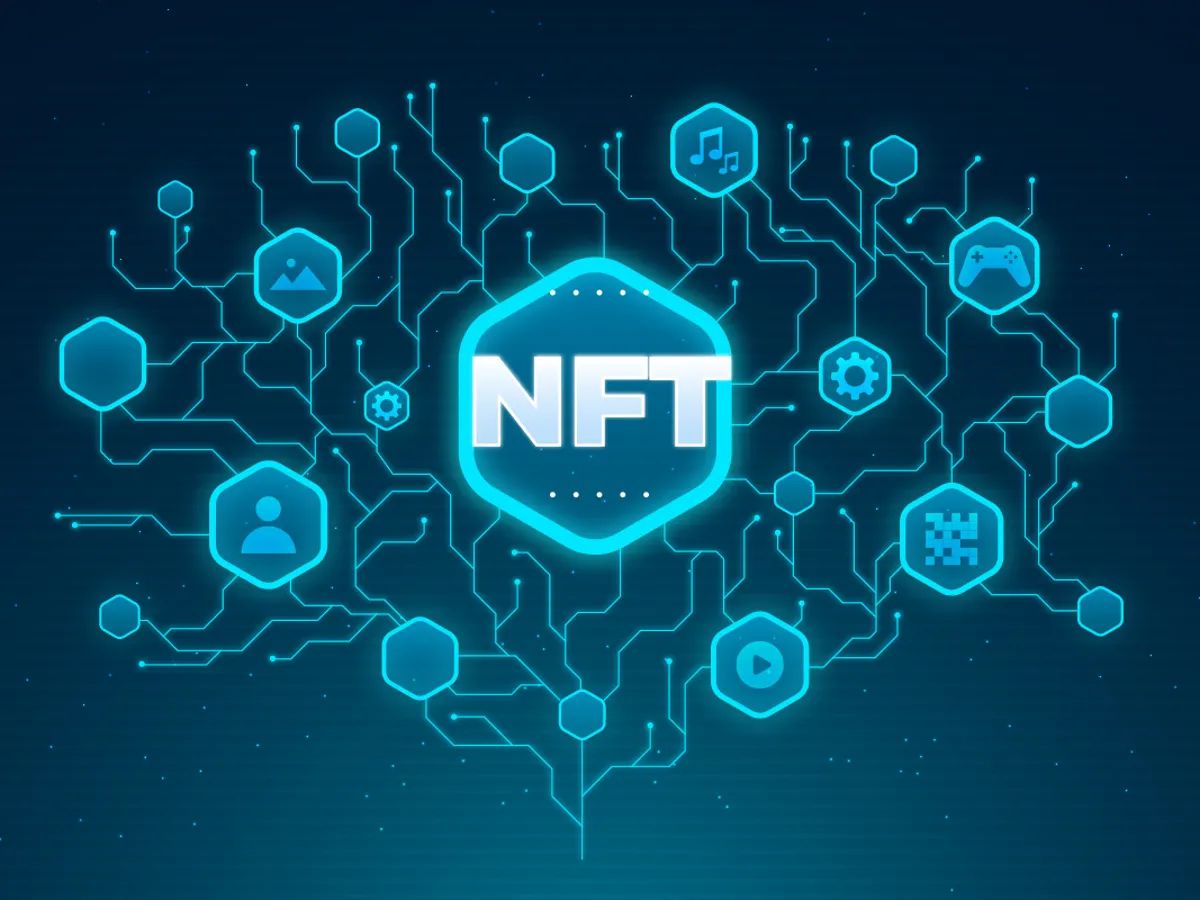Introduction
The emergence of blockchain technology has revolutionized various industries, offering unparalleled security, transparency, and efficiency in processes. Blockchain, originally developed as the underlying technology for cryptocurrencies such as Bitcoin, has now found its application in numerous sectors beyond the realm of finance. This distributed ledger technology has the potential to transform traditional systems, offering solutions to long-standing challenges.
Blockchain operates as a decentralized and immutable ledger, where transactions are recorded in a transparent and tamper-proof manner. Unlike traditional centralized systems, blockchain ensures that every participant in the network has access to the same information, eliminating the need for intermediaries and enhancing trust among parties.
This article explores the diverse applications of blockchain technology in various industries, showcasing its potential to disrupt and streamline existing processes. From finance to healthcare, supply chain management to identity verification, the possibilities for blockchain implementation are vast and promising.
By harnessing the power of blockchain, businesses can benefit from enhanced security, improved traceability, reduced costs, and increased efficiency in operations. Moreover, the decentralized nature of blockchain ensures that no single entity has control over the network, mitigating the risk of fraud or manipulation.
As we delve deeper into the specific applications of blockchain technology across industries, it becomes evident that this transformative technology holds the key to a more secure, transparent, and decentralized future.
Blockchain in Finance
Blockchain technology has had a profound impact on the financial industry, revolutionizing traditional processes and creating new opportunities for efficiency and security. With its decentralized nature and cryptographic security, blockchain has the potential to streamline transactions, reduce costs, and increase transparency in financial operations.
One of the most notable applications of blockchain in finance is in the realm of cross-border transactions. Traditional international transfers are often time-consuming and expensive, involving multiple intermediaries and complex processes. However, blockchain enables near-instantaneous and cost-effective cross-border transactions, eliminating the need for intermediaries and reducing transfer fees.
Additionally, blockchain-based smart contracts have revolutionized the way financial agreements are executed. Smart contracts are self-executing contracts that are written into code on the blockchain. They automatically execute transactions when specific conditions are met, eliminating the need for intermediaries and ensuring the secure and transparent execution of agreements.
Furthermore, blockchain technology has the potential to address issues of identity verification and fraud prevention in the financial sector. By leveraging blockchain-based identity solutions, individuals can have better control over their personal information, and institutions can verify customer identities more efficiently and securely.
Another significant application of blockchain in finance is in the area of financial asset management. Blockchain-based platforms enable the tokenization of assets, allowing fractional ownership and transferability of traditionally illiquid assets such as real estate or art. This opens up new investment opportunities and increases market liquidity.
While blockchain technology offers numerous advantages in the finance industry, it is important to address challenges such as scalability and regulatory compliance. Nevertheless, financial institutions are embracing blockchain as they recognize its potential to revolutionize the sector and drive greater efficiency and transparency.
In summary, blockchain technology has transformed the financial industry by introducing secure and efficient methods of conducting transactions, executing smart contracts, verifying identities, and managing financial assets. The continued adoption of blockchain in finance holds the potential to reshape the sector and create a more accessible and inclusive financial system.
Blockchain in Supply Chain Management
The supply chain management industry is ripe for disruption, and blockchain technology has emerged as a game-changer in this field. By providing transparency, traceability, and enhanced security, blockchain can revolutionize the way supply chains operate, ensuring efficiency, trust, and accountability.
One of the key challenges of traditional supply chain management is the lack of transparency. With multiple parties involved in the process, it can be difficult to track and verify the movement of goods and ensure their authenticity. However, by leveraging blockchain technology, supply chain participants can have real-time visibility into the entire process, from the origin to the final destination.
Blockchain enables the creation of a decentralized and immutable ledger, where each step in the supply chain is recorded and verified. This eliminates the possibility of fraudulent activities, counterfeit products, or data manipulation. Additionally, smart contracts can be utilized to automate and enforce agreements between different stakeholders in the supply chain.
Another significant benefit of blockchain in supply chain management is the ability to streamline and automate documentation processes. Instead of relying on paper-based records and manual verification, blockchain can provide a secure and tamper-proof repository for all relevant documents, such as invoices, bills of lading, and certificates of authenticity.
Furthermore, blockchain can facilitate the implementation of sustainability and ethical practices in supply chains. With increasing demand for transparency and responsible sourcing, blockchain enables the tracking of a product’s journey, from raw materials to the finished product, ensuring compliance with environmental and social standards.
The use of blockchain technology in supply chain management also enables efficient inventory management, reducing costs and minimizing waste. By having a real-time view of inventory levels, stakeholders can optimize their operations, reduce stockouts or excess inventory, and enhance overall supply chain efficiency.
However, the adoption of blockchain in supply chain management is not without its challenges. Interoperability, scalability, and data privacy are some of the key concerns that need to be addressed. Moreover, collaboration and standardization among industry players will be essential for the widespread adoption of blockchain solutions.
To summarize, blockchain technology has the potential to transform supply chain management by providing transparency, traceability, and security. By leveraging the decentralized and immutable nature of blockchain, supply chains can become more efficient, sustainable, and trustworthy, benefiting all stakeholders involved.
Blockchain in Healthcare
The healthcare industry is complex and highly sensitive, with numerous stakeholders requiring access to accurate and secure data. Blockchain technology offers a solution to many of the challenges faced by the healthcare sector, including data interoperability, patient privacy, and supply chain integrity.
One of the key advantages of implementing blockchain in healthcare is the ability to securely integrate and share medical records and data. With the use of blockchain, patient data can be stored in a decentralized and encrypted manner, ensuring privacy and security. This allows healthcare providers to access critical patient information in real-time, improving the quality of care and reducing medical errors.
Moreover, blockchain can streamline the process of sharing health data among different providers and specialists. Traditional methods often involve time-consuming manual transfers and result in fragmented records. By implementing blockchain-based solutions, patients can have a comprehensive and up-to-date medical history that is accessible to authorized healthcare professionals.
Another area where blockchain technology can significantly impact healthcare is in clinical research and trials. Blockchain can ensure the integrity of data collected during clinical trials, preventing fraud and manipulation. Additionally, it can improve the efficiency and transparency of the trial process by securely recording the consent of participants and tracking the progress of the trial.
Blockchain also has the potential to enhance the pharmaceutical supply chain by ensuring the authenticity and traceability of drugs. The use of blockchain can prevent counterfeit drugs from entering the market and facilitate the tracking of pharmaceutical products from production to delivery, thus reducing the risk of medication errors and improving patient safety.
Furthermore, blockchain technology enables individuals to have greater control over their health data and participate in decentralized healthcare systems. Patients can securely share their data with healthcare providers, researchers, or other relevant parties, giving them the ability to contribute to medical advancements while maintaining privacy and ownership of their information.
However, the implementation of blockchain in healthcare is not without challenges. Issues such as standardization, scalability, and regulatory compliance need to be addressed to ensure widespread adoption. Additionally, there is a need for collaboration among stakeholders to develop industry-wide solutions and establish trust in the technology.
In summary, blockchain technology holds immense potential to transform the healthcare industry by improving data interoperability, patient privacy, and supply chain integrity. By leveraging blockchain-based solutions, healthcare systems can become more efficient, secure, and patient-centered, ultimately enhancing the overall quality of care.
Blockchain in Real Estate
The real estate industry is traditionally known for its complex and paper-intensive processes. Blockchain technology has the potential to revolutionize the way real estate transactions are conducted, offering increased transparency, security, and efficiency.
One of the notable applications of blockchain in real estate is in the realm of property ownership and title management. By storing property records on a decentralized ledger, blockchain can provide a tamper-proof and transparent system for tracking ownership. This eliminates the risk of fraudulent activities, reduces the reliance on intermediaries, and ensures the accuracy of property records.
Moreover, blockchain-based smart contracts have the potential to streamline and automate real estate transactions. Smart contracts eliminate the need for manual paperwork, reduce the risk of errors, and ensure that all parties involved in the transaction comply with pre-set conditions. This increases efficiency and reduces the time and costs associated with traditional escrow processes.
Blockchain can also address challenges related to property financing and crowdfunding. Through tokenization, real estate assets can be divided into digital tokens, enabling fractional ownership and opening up investment opportunities to a larger pool of potential investors. Blockchain-based platforms allow for secure and transparent crowdfunding, facilitating peer-to-peer transactions within the real estate market.
Additionally, blockchain can improve the efficiency and transparency of property leasing and rental agreements. By utilizing smart contracts, landlords and tenants can automate the payment process, enforce terms and conditions, and ensure that all parties comply with the agreement. This reduces the need for intermediaries and minimizes the risk of disputes.
Furthermore, blockchain technology can enhance the due diligence process in real estate transactions. By recording information about property history, legal documents, and inspections on the blockchain, potential buyers and investors can access a comprehensive and immutable record of the property. This simplifies the due diligence process and increases trust among stakeholders.
However, the adoption of blockchain in real estate does face challenges. Issues related to regulatory compliance, data privacy, and standardization need to be addressed for widespread adoption. Collaboration between real estate industry players and technology providers is essential to develop industry-wide standards and drive the integration of blockchain solutions.
In summary, blockchain technology has the potential to transform the real estate industry by increasing transparency, security, and efficiency in property transactions. From property ownership and leasing to crowdfunding and due diligence, blockchain offers solutions to long-standing challenges, paving the way for a more transparent and accessible real estate market.
Blockchain in Voting Systems
The integrity and security of voting systems are crucial for upholding democratic processes. Blockchain technology offers a solution to enhance trust, transparency, and efficiency in voting systems, ensuring that elections are fair, tamper-proof, and accessible to all eligible voters.
One of the key benefits of implementing blockchain in voting systems is the immutability and transparency it provides. By storing votes on a decentralized ledger, every transaction is recorded and cannot be altered, ensuring the integrity of the voting process. This eliminates the risk of tampering, fraud, or manipulation, enhancing trust among voters and increasing confidence in election outcomes.
Additionally, blockchain technology enables secure and verifiable voting through cryptographic features. Each voter is assigned a unique digital identity, which allows for anonymous verification while ensuring that individuals can participate only once in the election. This safeguards voter privacy while maintaining the integrity of the voting process.
Another advantage of blockchain-based voting systems is the potential to increase accessibility. Blockchain allows for remote and online voting, enabling individuals to cast their votes from anywhere, eliminating geographical constraints, and enhancing voter turnout. This is particularly beneficial for individuals who are physically unable to visit polling stations or for those living abroad.
Furthermore, blockchain can enhance the auditing and verification process in elections. With traditional voting systems, the auditing process can be time-consuming and cumbersome. However, with the transparent nature of blockchain, election authorities and stakeholders can validate and audit the voting results in real-time, ensuring the accuracy and fairness of the process.
Nevertheless, the implementation of blockchain in voting systems does face challenges. Issues such as voter identity verification, scalability, and accessibility for individuals with limited technological resources need to be addressed. Moreover, public and political trust in the technology must be established to ensure widespread adoption.
Collaboration among governments, technology providers, and election authorities is crucial to develop and implement blockchain-based voting systems. Pilots and trials can be conducted to test the efficiency, security, and usability of the technology in the context of elections.
To summarize, blockchain technology has the potential to revolutionize voting systems by enhancing trust, integrity, and accessibility. By leveraging the decentralized and transparent nature of blockchain, elections can become more secure, efficient, and inclusive, ensuring that the democratic process is upheld.
Blockchain in Identity Verification
Identity verification is a critical aspect of numerous digital transactions and interactions, including financial services, online platforms, and government processes. Blockchain technology offers a secure and decentralized solution to enhance identity verification processes, providing individuals with greater control over their personal information and reducing the risk of fraud.
Traditional methods of identity verification often involve sharing sensitive personal information with multiple parties, increasing the risk of data breaches and identity theft. By leveraging blockchain, individuals can have more control over their personal data through self-sovereign identity solutions. With self-sovereign identity, individuals can maintain ownership of their personal information stored on the blockchain and selectively share it with trusted entities when needed, eliminating the need for third-party intermediaries.
Blockchain-based identity verification can also enhance privacy by minimizing the amount of personal information shared. Rather than providing full access to personal data, blockchain allows for the verification of specific attributes without revealing unnecessary details. For instance, a user can prove their age without disclosing their exact date of birth.
Furthermore, blockchain enables the validation and authentication of identity credentials. Through cryptographic mechanisms, credentials can be digitally signed by trusted issuers and stored on the blockchain, ensuring their authenticity and integrity. These digitally verifiable credentials can then be used for identity verification purposes across different platforms and organizations, simplifying and streamlining the verification process.
Another advantage of blockchain in identity verification is the potential for cross-border identification. Traditional identification systems may face challenges when dealing with individuals who do not have access to recognized identity documents. However, with blockchain-based identity, individuals can create a digital identity that can be validated and recognized globally, enabling access to services and opportunities.
However, the adoption of blockchain in identity verification is not without challenges. Interoperability between various blockchain-based identity solutions, as well as compliance with legal and regulatory frameworks, are key considerations. Collaboration among industry stakeholders and standardization efforts are essential to ensure seamless integration and widespread adoption.
In summary, blockchain technology has the potential to transform identity verification processes by providing individuals with control, privacy, and security. By leveraging blockchain, identity verification can become more efficient, secure, and user-centric, ultimately enhancing trust in digital transactions and interactions.
Blockchain in Energy Trading
The energy sector is undergoing significant transformation with the integration of renewable energy sources, decentralized energy generation, and evolving energy markets. Blockchain technology has emerged as a promising solution to improve transparency, efficiency, and trust in energy trading.
Blockchain can facilitate peer-to-peer energy trading by creating a decentralized and transparent marketplace. Through the use of smart contracts, energy producers and consumers can directly transact with each other, eliminating the need for intermediaries and reducing transaction costs. This enables the efficient utilization of distributed energy resources and promotes the adoption of renewable energy.
One of the key advantages of blockchain in energy trading is the ability to track energy generation and consumption in real-time. By recording energy production and consumption on a transparent and immutable ledger, blockchain enables stakeholders to accurately monitor and verify energy transactions. This promotes trust among participants and reduces the possibility of fraud or misinformation.
Moreover, blockchain technology can enable the integration of microgrids and peer-to-peer energy sharing. With blockchain, local communities can create decentralized energy systems, allowing surplus energy to be shared and traded within the community. This increases energy access, promotes energy resiliency, and supports the transition to a more sustainable energy future.
Additionally, blockchain enhances the traceability and certification of renewable energy attributes. Energy producers can record the source of their energy generation on the blockchain, providing a transparent and auditable record of renewable energy production. This enables the creation of renewable energy certificates and facilitates the tracking of renewable energy usage for compliance and sustainability reporting.
However, the implementation of blockchain in energy trading does face challenges. Interoperability between different blockchain platforms, scalability, and regulatory frameworks are key considerations. Moreover, coordination and standardization efforts among energy market participants are crucial to ensure the widespread adoption of blockchain solutions.
In summary, blockchain technology has the potential to revolutionize energy trading by promoting transparency, efficiency, and trust. By enabling peer-to-peer energy transactions, tracking energy generation and consumption in real-time, and supporting the integration of renewable energy sources, blockchain accelerates the transition to a decentralized and sustainable energy future.
Blockchain in Intellectual Property
Intellectual property (IP) protection is crucial for encouraging innovation and creativity. Blockchain technology offers a secure and decentralized solution to address the challenges of IP management, providing transparency, immutability, and proof of ownership.
One of the key applications of blockchain in intellectual property is in the realm of digital rights management. Blockchain enables the creation of a decentralized and tamper-proof registry, where creators can register their works and establish proof of ownership. This ensures that creators are recognized for their creations and have a secure record of their intellectual property rights.
Moreover, blockchain technology can facilitate the licensing and monetization of intellectual property. Smart contracts can be embedded in the blockchain, automating the licensing process and ensuring that creators receive fair compensation for the use of their intellectual property. This eliminates the need for intermediaries and reduces transaction costs, providing a more efficient and transparent system for IP licensing.
Additionally, blockchain enables the tracking and protection of IP throughout its lifecycle. By recording transactions and changes to IP ownership on the blockchain, stakeholders can trace the history of an asset and verify its authenticity. This reduces the risk of IP infringement and provides a reliable source of information for due diligence and enforcement purposes.
Another benefit of utilizing blockchain in intellectual property management is the protection of digital content. With the rise of digital media, piracy and unauthorized use of content have become significant challenges. Blockchain-based solutions can ensure the integrity and authenticity of digital content, preventing unauthorized copying or modification. This safeguards the rights of creators and encourages the production of high-quality digital content.
However, the adoption of blockchain in intellectual property faces challenges. Addressing issues such as scalability, standardization, and legal frameworks is crucial to ensure the widespread adoption of blockchain solutions for IP management. Collaboration among IP rights holders, technology providers, and regulatory bodies is essential to develop industry-wide standards and frameworks.
In summary, blockchain technology has the potential to transform intellectual property management by providing transparency, proof of ownership, and efficient licensing mechanisms. By leveraging blockchain, creators can protect their IP rights, enforce licensing agreements, and prevent unauthorized use of their works, fostering innovation and creativity in a digital age.
Blockchain in Gaming and Virtual Reality
Gaming and virtual reality (VR) are rapidly evolving industries, and blockchain technology has emerged as a disruptive force, offering new opportunities and enhancing user experiences. Blockchain can revolutionize gaming and VR by improving ownership of digital assets, enabling decentralized marketplaces, and enhancing transparency and security.
One of the key applications of blockchain in gaming and VR is in the realm of digital asset ownership. Traditionally, gamers do not have true ownership over virtual items and in-game assets. With blockchain, digital assets can be tokenized and recorded on the blockchain, giving gamers true ownership and the ability to transfer, sell, or trade their items outside of the game environment. This introduces a new level of value and scarcity to virtual items, creating a thriving marketplace for digital assets.
Moreover, blockchain enables the creation of decentralized marketplaces for in-game items and virtual experiences. Instead of relying on centralized platforms, blockchain-based marketplaces allow for peer-to-peer transactions, eliminating the middleman and increasing accessibility and efficiency. This empowers gamers and content creators, enabling them to monetize their skills and creations directly without limitations.
Furthermore, blockchain can enhance transparency and fairness in gaming and esports competitions. By recording game outcomes and player statistics on the blockchain, results can be verified independently and cannot be manipulated. This ensures fair competition, prevents cheating, and enhances the integrity of esports tournaments.
Additionally, blockchain technology can address issues related to digital rights and piracy in the gaming industry. By utilizing blockchain’s cryptographic features, game developers can protect their intellectual property and combat unauthorized copying or distribution of games. This strengthens copyright protection and encourages the development of high-quality games.
Blockchain also has the potential to enhance virtual reality experiences by addressing issues such as content discovery and intellectual property rights. With decentralized VR platforms powered by blockchain, creators can share and monetize their VR experiences directly with users, eliminating the need for intermediaries and enabling a more immersive and diverse VR ecosystem.
However, the adoption of blockchain in gaming and VR faces challenges. Scalability, user experience, and regulatory considerations need to be addressed to ensure seamless integration. Industry collaboration and standardization efforts are crucial to create interoperability and widespread adoption of blockchain solutions.
In summary, blockchain technology has the potential to revolutionize gaming and virtual reality by providing true ownership of digital assets, enabling peer-to-peer transactions, enhancing transparency and fairness, and strengthening intellectual property rights. By leveraging blockchain, the gaming and VR industries can redefine the way content is created, shared, and monetized, leading to exciting new possibilities for gamers and content creators.
Conclusion
Blockchain technology has emerged as a powerful tool with the potential to reshape various industries. From finance to healthcare, supply chain management to gaming, blockchain offers solutions to long-standing challenges, revolutionizing processes and enhancing trust, transparency, and efficiency.
In finance, blockchain has disrupted traditional systems, enabling secure and efficient transactions, smart contract execution, and identity verification. The decentralized and transparent nature of blockchain fosters trust among parties and reduces the dependence on intermediaries.
Supply chain management has also benefited from blockchain implementation. By providing transparency and traceability, blockchain ensures that stakeholders have real-time visibility into the movement of goods, reducing fraud, improving efficiency, and promoting responsible sourcing.
In healthcare, blockchain has the potential to enhance patient privacy, improve data interoperability, and streamline processes such as medical record management and clinical trials. The secure and verifiable nature of blockchain provides a trusted infrastructure for managing sensitive healthcare data.
The real estate industry can leverage blockchain to improve property ownership and title management, automate transactions through smart contracts, and enhance transparency in property leasing and rental agreements. Blockchain increases trust and efficiency in real estate transactions, benefiting buyers, sellers, and other stakeholders.
Voting systems can also benefit from blockchain technology, ensuring secure and transparent voting processes, enhancing privacy, and reducing the risk of manipulation. Blockchain enables decentralized and verifiable voting systems, increasing trust in democratic processes.
Blockchain-based identity verification empowers individuals to have more control over their personal information, enables secure and selective sharing of identity attributes, and increases trust in digital transactions and interactions.
In energy trading, blockchain facilitates peer-to-peer trading, improves traceability in renewable energy transactions, and enables the integration of microgrids. Blockchain promotes transparency, efficiency, and sustainability in the energy sector.
Furthermore, blockchain technology provides opportunities for protecting intellectual property rights, enhancing digital asset ownership in gaming and virtual reality, and improving transparency in digital content distribution.
In conclusion, blockchain technology holds immense potential to transform industries by enhancing security, transparency, and efficiency. While challenges exist in terms of scalability, interoperability, and regulatory frameworks, the continued collaboration and innovation in blockchain can pave the way for a decentralized and trust-based future.

























